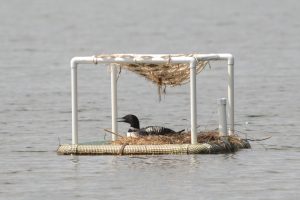Please don't get too close to loon nests, especially when chicks are present!

The Loon, as most people know, is the Minnesota"state bird". It is known for it's eerie and haunting variety of calls as well as it's excellent diving ability. Loons have been known to dive to 240 foot depths! Loons can fly at 60 mph and are very graceful both in the air and on the water, however they cannot travel well on land mainly because of the far rear placement of their legs on the body making them very awkward and top heavy.
North Long supports a large number of Loons that nest naturally on the lake as well as on the seven artificial platforms that association volunteers have placed during May and June. We usually see about a 50% hatching success rate on the artificial platforms.
Loons usually lay 2 brown speckled eggs, slightly larger than a chicken egg. Both parents share in the incubation and raising of the chicks. During the first 2 weeks of life the baby chicks are totally helpless and dependent on their parents. They are usually seen riding on the back of the parents as their soft down gets water logged and makes it difficult for them to survive due to exposure to the elements.
Loons are very protective and if approached too close will put on fantastic displays of distress that includes something called "penguin dancing".
In this display the loon rushes forward across the water toward the intruder and rises with head drawn back and the bill almost touching the breast while the feet beat the water and create a spray around the breast of the bird. Humans triggering this behavior often don't understand that they have come to close to a nest or chicks and continue to observe the display until the Loon leaves the area. If you encounter this display please back off and give the Loons some space as this may affect the success of our loon nesting efforts. The favorite food of the loon is suckers, minnows, bluegills, gizzard shad, crayfish, snails, leeches, frogs and salamanders. Quite a well balanced diet of freshwater delicacies!
Thanks to all the volunteers who place and maintain the nests and a special thanks this year to Dusten Olejnicak for building and repairing nests as part of a project in which he earned his Eagle Scout award.
For more information on loons please visit these sites on the web.